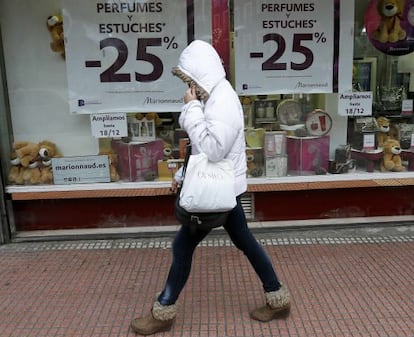The crisis that stole Christmas
Stores and markets report decreased sales despite a bustle of festive shoppers

Frantic shoppers on the streets signal Christmas has well and truly begun. Luminous markets and tinsel-tacked shops show Spain is refusing to void the holiday period this year despite the overflowing feed of crises reports. But behind the cheerful festivities, Spain's fifth Christmas in crisis is far from the plump feast it was in more prosperous times. Indeed, many Three Kings' sacks will be lighter this year.
If high unemployment and fear of further cutbacks were reason enough for belt-tightening this holiday, shoppers have had to compete with higher sales tax and a blocking of end-of-year bonuses. In September alone, when the VAT hike was introduced, year-on-year retail sales dropped 12.7 percent, the lowest recorded by Spain's National Institute of Statistics (INE) since 2004. October was equally grim with an 8.4-percent drop and the downward trend is expected to continue through December.
"In previous years you might have spent 300 or 400 euros on presents, but this year we'll be grateful if we can spend more than 100," market shopper Noelia Serrano told AFP news agency.
Paloma Martín, a 51-year-old health worker, says she is spending less in fear that recent cuts in the sector could impact on her next year. "Although I have a job at the moment, I don't know whether I'll still have it come January or whether they'll fire me," she told AFP.
Stores have absorbed sales tax hikes so not to scare off shoppers
Even the sugary Spanish turrón , a ubiquitous treat on Christmas dinner tables around Spain, is taking a hit in sales.
"It's as if at Christmas, without turrón, something is missing," store manager Amelia Almodóvar told AFP.
Almodóvar oversees the famous Casa Mira store in central Madrid, which is packed with shoppers in the lead-up to Christmas. But she says demand is definitely lower this year, and as such, their nougat production is now a ton less than it was in 2008.
In the fish markets, too, a change in habits has been noticed. While last-minute Christmas purchases could "save the year" for traders, consumers are coming with more limited budgets and make decisions based on price rather than choice.
According to the president of the National Federation of Fish Retail Associations (FEDEPESCA), Gonzalo González, the greatest demand is for sea bass and hake, whereas delicacies such as crab or goose barnacles are generating less attention.
Christmas spending is estimated to have fallen by 40 percent since 2007"
But it is not because prices have risen from sales tax hikes. The president of Guild Fish Wholesalers Barcelona, Leandre Serra, told Efe that traders have assumed the tax so consumers would not notice.
But the mad Christmas rush is struggling to match previous years of festive spending. According to ESADE business school professor Jaime Castelló, Christmas spending by Spanish households is estimated to drop 40 percent this year, compared to 2007 when average spending was as high as 1,000 euros.
Now, it is only about 600 euros, Castelló told AFP.
"The impact of the crisis is definitely going to be felt by nearly all Spanish families this Christmas," says Castelló.
He notes that Spain's unemployment figures mean 25 percent of families have to "drastically reduce their budget."
"Christmas is going to be very different for them. They will have to focus spending on the essentials of Christmas - in Spain that means food," he said.
But the crisis has done little to quash Spaniards' hope. Long lines outside "lucky" lottery ticket outlets - considered so because of past wins - indicate the unwavering popularity of the Christmas lottery, known as El Gordo, or "The Fat One," which will be drawn on Saturday.
Right now in Spain it is almost easier to win the lottery than to find a job"
Lottery commercial director Juan Antonio Gallardo told AFP that 2012 ticket sales were "similar to or slightly lower" than 2011, with an overall decrease of only 3.5 percent since 2008.
"It's a tradition in Spain. It's in Spaniards' DNA," Gallardo said.
But for some, the lottery has become the last resort as the crisis broadens its grip on the Spanish population.
Kiko Villar, who has been unemployed for a year, bought his first ever Gordo ticket this year.
"It's very sad really, but right now in Spain it is almost easier to win the lottery than to find a job."
Tu suscripción se está usando en otro dispositivo
¿Quieres añadir otro usuario a tu suscripción?
Si continúas leyendo en este dispositivo, no se podrá leer en el otro.
FlechaTu suscripción se está usando en otro dispositivo y solo puedes acceder a EL PAÍS desde un dispositivo a la vez.
Si quieres compartir tu cuenta, cambia tu suscripción a la modalidad Premium, así podrás añadir otro usuario. Cada uno accederá con su propia cuenta de email, lo que os permitirá personalizar vuestra experiencia en EL PAÍS.
¿Tienes una suscripción de empresa? Accede aquí para contratar más cuentas.
En el caso de no saber quién está usando tu cuenta, te recomendamos cambiar tu contraseña aquí.
Si decides continuar compartiendo tu cuenta, este mensaje se mostrará en tu dispositivo y en el de la otra persona que está usando tu cuenta de forma indefinida, afectando a tu experiencia de lectura. Puedes consultar aquí los términos y condiciones de la suscripción digital.








































